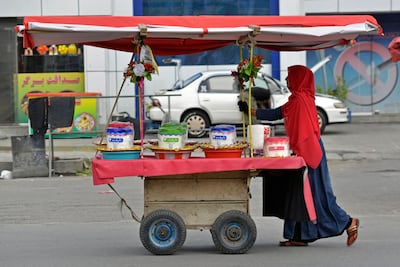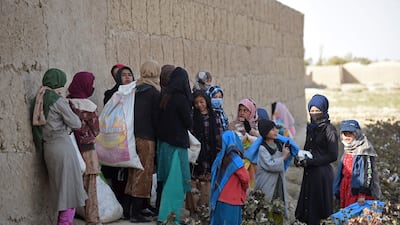The UN’s World Food Programme has renewed its appeal for aid to Afghanistan, saying one million mothers and their children now face malnutrition.
After struggling through Covid-19 and heavy fighting during the Taliban takeover in August 2021, poverty has surged in the landlocked, rugged nation of 42 million that has endured decades of war.
John Aylieff, WFP’s regional director for Asia and the Pacific, made the appeal on Sunday, speaking in a video from Kunduz, a northern Afghan city of about 300,000 people.
He said the WFP was distributing cash aid to help the local economy, an increasingly common form of humanitarian assistance to uphold local markets.
“People have very little means to buy and employment opportunities are very few. People have depleted their savings already. Many have sold their assets, the cash we distributed today is a lifeline for these most vulnerable families, many rely on it,” he said.
“Two months ago, we told 85 per cent of [Afghans] that we were cutting them from the programme because our funding was running out. Those who are here today, some 4,700 households will be told in two months. There is also nothing left for them as winter is approaching here in Afghanistan, and it will be brutal. WFP faces an unprecedented funding crisis. We need a billion dollars to sustain 15 million people through this winter,” he warned.
“We must not walk away from Afghanistan; donors must step up for the sake of humanity. We must invest in Afghanistan's future.”
Aid has been lacklustre since the US and Europe froze around $7 billion worth of central bank funds amassed under the former regime. The US unfroze around half of that amount last year as humanitarian conditions deteriorated, through a US-Swiss-managed fund that seeks to ensure money is spent on aid.
Even still, aid funding has fallen away as NGOs, many of them contracting with US and European government agencies, halted work, citing security fears following the Taliban takeover, while Western governments cut assistance in protest at Kabul’s policies on human rights.
Compounding the problem, the Taliban has also prevented women from working on UN projects throughout the country, creating a standoff between Kabul and the UN over the future of aid projects.
Washington has been holding talks with the Taliban in Doha this year, focused on building co-operation on key sectors, including women’s rights, and the rights of minorities in the diverse country, after the Taliban stopped girls over the age of 10 from attending primary school.

But progress has been slow. The US insists co-operation is contingent on the Taliban ensuring that terrorist groups cannot use Afghan territory. The UN in June said the Taliban maintains its relationship with Al Qaeda, 23 years after the country was used as a base by the group for the September 11 attacks.
“In Afghanistan, so far this year, we've provided fortified school snacks to 1 million children – half of them are girls,” the WFP said on Friday on social media platform X, formerly Twitter.
International NGO World Vision, which focuses on children’s rights, says that while food insecurity has reached around 36 per cent of the population, “over 29.2 million Afghans will require humanitarian assistance in 2023”. That represents almost 80 per cent of households, World Vision said, adding that many families are falling into debt.
“Over three million children face acute malnutrition,” the organisation warned earlier this month.
Aid is trickling in, but sums remain far short of the growing need. Earlier this month, the EU said it would send €140 million ($149.4 million).
The EU said the funds would go to the “basic needs and livelihoods assistance in the fields of education, health, agriculture and women's economic empowerment in Afghanistan”.
The funds came from a one billion dollar support package, most of which has now been dispersed, said the EU.

